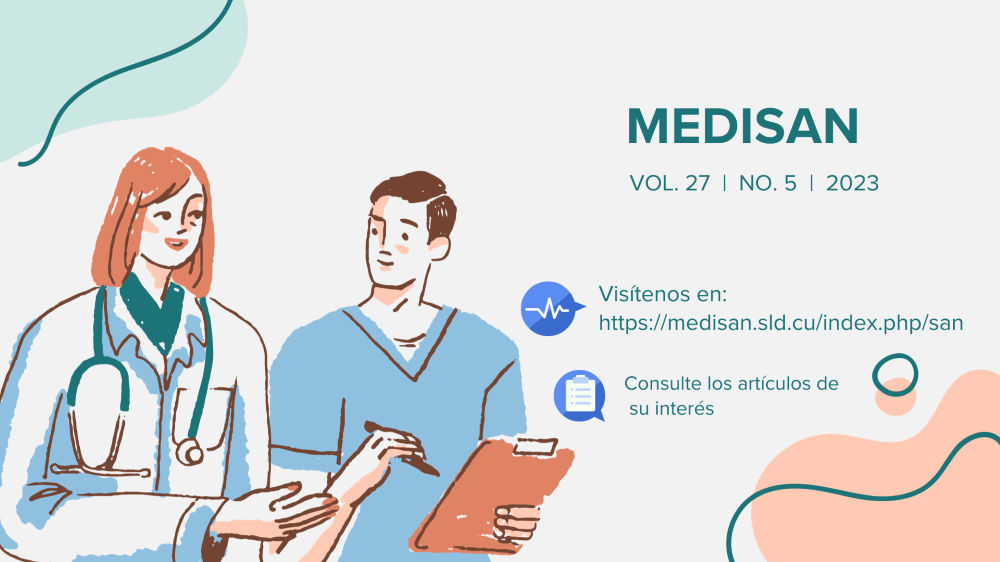Characteristic of foods consumption and alimentary culture in COVID-19 convalescent individuals
Keywords:
COVID-19, consumption of foods, alimentary behavior.Abstract
Introduction: An appropriate nutrition is the key to develop immunity, protection against diseases and infections, and support the recovery.
Objective: To identify the characteristics of foods consumption and alimentary culture in COVID-19 convalescent persons.
Methods: An observational, descriptive and cross-sectional study was carried out, from May to December 2020, of 67 patients over 20 years convalescent from COVID-19, with negative results in the polymerase chain reaction test for a month, who belonged to a health area of Havana city. Some sociodemographic, dietary and nutritional state variables were analyzed.
Results: The disease was presented more frequently in male sex (59.7%) and the 20 to 39 age group (47-8%). A high percentage of general overweight was identified (59.7), and the most consumed and preferred foods were the energy-giving in the afternoon-night time (89.6%), as well as those fried products and poultry skin (38.8%). The consumption of vegetables and fruits was low (29.9 and 40.3%, respectively) and there was a poor variety in the diet (86.4%), since they didn't consume foods from the 7 basic groups daily, although most of them (70.0%) had 3 meals a day.
Conclusions: The studied individuals possessed a poor alimentary culture expressed by limited or wrong knowledge, what is a warning about the necessity of having an educational instrument for the adoption of attitudes and healthy alimentary habits leading to the restoration of immunity.
Downloads
References
2. Romo Romo A, Reyes Torres CA, Janka Zires M, Almeda Valdes P. El rol de la nutrición en la enfermedad por coronavirus 2019 (COVID-19). Rev Mex Endocrinol Metab Nutr. 2020 [citado 12/01/2022];7:132-43. Disponible en: https://www.revistadeendocrinologia.com/files/end_20_7_3_132-143.pdf
3. Gálvez P, Carroza MB, Araya Bannout M, Marin A, Aranda J, Estay P, et al. Derecho a la alimentación y COVID-19: Estudio cualitativo de percepciones de actores clave en Chile. Rev Chil Nutr. 2021 [citado 25/03/2022];48(6). Disponible en: https://www.scielo.cl/scielo.php?script=sci_arttext&pid=S0717-75182021000600901&lng=en.%20http://dx.doi.org/10.4067/S0717-75182021000600901
4. Iruela Fernández L. Etapa pos-COVID-19 en Cuba, un después o una continuidad. Medimay. 2020 [citado 24/05/2023];27(3). Disponible en: https://revcmhabana.sld.cu/index.php/rcmh/article/view/1713/pdf_264
5. Arias Rivera ML. Perspectiva estratégica en la gestión de la COVID-19 en Cuba. CLACSO. La Habana: CETED; 2020 [citado 12/01/2022]. Disponible en: https://www.clacso.org/perspectiva-estrategica-en-la-gestion-de-la-covid-19-en-cuba/
6. Valdés Silva MF, Gutiérrez Rios R, Triana Santamaria O, Gamboa Díaz Y. La nutrición, un importante aspecto en pacientes con la COVID-19. Progaleno. 2021 [citado 16/03/2022];4(1). Disponible en: https://revprogaleno.sld.cu/index.php/progaleno/article/view/230/103
7. Marti del Moral A. Importancia de la nutrición óptima frente a covid-19. Gaceta Médica. 2020 May [citado 29/01/2022]. Disponible en: https://gacetamedica.com/opinion/importancia-de-la-nutricion-optima-frente-a-covid-19/
8. Porrata C, Monterrey P, Castro D, Rodríguez L, Martin I, Sánchez R, et al. Guías alimentarias para la población cubana mayor de dos años de edad. La Habana: MINSAP; 2016 [citado 29/01/2022]. Disponible en: https://extranet.who.int/ncdccs/Data/CUB_B14_Gu%C3%ADas%20alimentarias%20rectificadas%202016.pdf
9. Savino P, Rodríguez MP, Borráez O. Recomendaciones de la Academia Nacional de Medicina sobre alimentación y nutrición frente a la infección por SARSCOV2 - COVID-19. Rev Medicina. 2020;42(3):456-85.
10. Recomendaciones nutricionales para la población cubana, 2008 Estudio multicéntrico. Rev Cuban Invest Bioméd. 2009 [citado 25/03/2022];28(2). Disponible en: http://scielo.sld.cu/scielo.php?script=sci_arttext&pid=S0864-03002009000200001&lng=es
11. Shetty PS, James WP. Body mass index. A mearsure of chronic energy deficiency in adults. FAO Food Nutr Pap. 1994;56:1-57.
12. Garcés García-Espinosa L. Recomendaciones alimentarias y nutrimentales para el sostén de la inmunocompetencia. Rev Cuban Aliment Nutr. 2020 [citado 25/03/2022];30(1). Disponible en: https://revalnutricion.sld.cu/index.php/rcan/article/view/989/pdf_221
13. Echevarría D. La obesidad: posibles mecanismos que explican su papel como factor de riesgo de la COVID-19. Rev Cuban Aliment Nutr. 2020 [citado 25/03/2022];30(1). Disponible en: https://revalnutricion.sld.cu/index.php/rcan/article/view/988/pdf_229
14. Villaseñor Lopez K, Jiménez Garduño AM, Ortega Regules AE, Islas Romero LM, González Martinez OA, Silva Pereira TS. Cambios en el estilo de vida y nutrición durante el confinamiento por SARS-CoV-2 (COVID-19) en México: Un estudio observacional. Rev Esp Nutr Hum Diet. 2021 [citado 25/03/2022];25(Supl. 2):e1099. Disponible en: https://renhyd.org/index.php/renhyd/article/view/1099/662
15. Almendra Pegueros R, Baladia E, Ramírez Contreras C, Rojas Cárdenas P, Vila Martí A, Moya Osorio J, et al. Conducta alimentaria durante el confinamiento por COVID-19 (CoV-Eat Project): protocolo de un estudio transversal en países de habla hispana. Rev Nutr Clín Metab. 2021 [citado 25/03/2022];4(3). Disponible en: https://revistanutricionclinicametabolismo.org/public/site/267_Protocolo_PenL.pdf
16. Pérez Rodrigo C, Gianzo Citores M, Hervás Bárbara G, Ruiz Litago F, Casis Sáenz L, Aranceta Bartrina J, et al. Cambios en los hábitos alimentarios durante el periodo de confinamiento por la pandemia COVID-19 en España. Rev Esp Nutr Comunitaria. 2020 [citado 25/03/2022];26(2). Disponible en: https://www.renc.es/imagenes/auxiliar/files/RENC_2020_2_0X_Cambios_habitos_alimentarios_estilos_vida_confinamiento_Covid-19(1).pdf
17. Bonett Gorbea M, Varona Pérez P, Chang La Rosa M, García Rocha RG, Suárez Medina R, Arcia Montes de Oca N, et al. III Encuesta de factores de riesgo y actividades preventivas de enfermedades no transmisibles. Cuba 2010-2011. La Habana: Editorial Ciencias Médicas; 2014 [citado 20/05/2021]. Disponible en: http://www.bvs.sld.cu/libros/encuesta_nacional_riesgo/encuesta_completo.pdf
18. Pérez Santana MB. Sobre la actuación alimentaria y nutricional durante la convalecencia después de la Covid-19. Rev Cuban Aliment Nutr. 2020 [citado 25/03/2022];30(1). Disponible en: https://revalnutricion.sld.cu/index.php/rcan/article/view/995/pdf_232
19. Rivas Estany EB, de la Noval García R. Obesidad en Cuba y otras regiones del Mundo. Consideraciones generales y acciones nacionales de prevención. Anales de la Academia de Ciencias de Cuba. 2021 [citado 25/03/2022];11(1). Disponible en: https://revistaccuba.sld.cu/index.php/revacc/article/view/887/1037
20. Organización Mundial de la Salud. Consejos de nutrición para adultos durante el brote de COVID-19. Ginebra: OMS; 2020 [citado 19/03/2022]. Disponible en: https://www.who.int/es/campaigns/connecting-the-world-to-combat-coronavirus/healthyathome/healthyathome---healthy-diet
Published
How to Cite
Issue
Section
License
All the articles can be downloaded or read for free. The journal does not charge any amount of money to the authors for the reception, edition or the publication of the articles, making the whole process completely free. Medisan has no embargo period and it is published under the license of Creative Commons, International Non Commercial Recognition 4.0, which authorizes the copy, reproduction and the total or partial distribution of the articles in any format or platform, with the conditions of citing the source of information and not to be used for profitable purposes.





